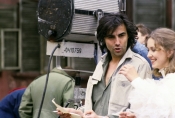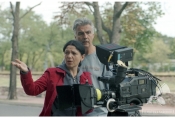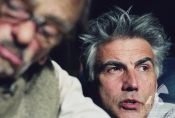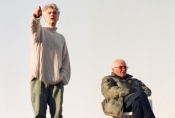Krzysztof Krauze
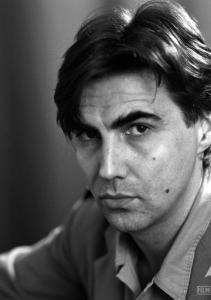
Film director, screenwriter, cinematographer. He was born on April 2, 1953, in Warsaw. A graduate of the Cinematography Department of the State Higher School of Film, Television and Theatre in Łódź (1976, diploma in 1978). After graduation, he became involved with the Łódź Studio of Small Film Forms "Se-Ma-For", where he made several short animated, feature and mixed-technique films: Symetrie/Symmetries (1977), Elementarz /Primer (1978), Dwa listy/Two Letters (1979), Deklinacja/Declination (1979), Praktyczne wskazówki dla zbieracza motyl/Practical Tips For The Collector Of Butterflies (1980), Dzień kobiet/Women's Day (1981). In 1983, he shot two documentary films at the Karol Irzykowski Film Studio: Robactwo/Vermin (1984) and Jest/Is (1984).
He debuted as a feature film director in 1988, with the contemporary drama Nowy Jork – czwarta rano/New York City – Four in the Morning (award for best debut film in Gdynia). He earned popularity and recognition with Gry uliczne/Street Games (1996, awards in Gdynia), a story of two inquisitive young people – a journalist and cameraman – who are investigating the tragic death of a Krakow student (prior to writing the script of this film, Krauze, together with Jerzy Morawski, had made two documentary films devoted to the tragic death of Stanisław Pyjas). Three years later, he made Dług/The Debt (several awards in Gdynia, the Golden Lion, five Eagles, Warsaw Mermaid, Gold Ribbon) – the story of two friends who decide to set up a joint company. When they are refused a loan from the bank, a classmate of one of them (whom they meet by accident) offers to help. Unfortunately, the business falls through but the classmate says he has incurred some costs and wasted time. And his time – as it turns out – is extremely valuable... There had never before been so much suspense in Polish cinema.
His subsequent film brought him more than thirty festival awards (including awards in Gdynia, Karlovy Vary, Chicago, Manila, Valladolid, Athens, Los Angeles, and five Eagle awards) – Mój Nikifor/My Nikifor (2004), depicting three months in 1960 and two days in 1967, when the great exhibition of works by the title character opened in Zachęta, and one day from the following year – the day of his death. His next film, made together with his wife Joanna Kos-Krauze, Plac Zbawiciela/Saviour Square (2006) – the dramatic story of a young married couple with two children, who find themselves in financial trouble – also proved a triumph at many festivals (several awards in Gdynia, including the Golden Lion, awards in Sozhou, Valladolid, Trieste, Moscow, Zimbabwe, four Eagles, Gold Ribbons). His latest film – Papusza (2013, co-directed by Joanna Kos-Krauze), the story of a famous Gypsy poet, has also won numerous festival awards, including honours in Karlovy Vary.
In 2008-2011 Krzysztof Krauze was the chairman of the Polish Film Institute. He was awarded the Order of Polonia Restituta (2011).
Jerzy Armata
Selected filmography
-
1996
STREET GAMES
-
1999
THE DEBT
-
2004
MY NIKIFOR
